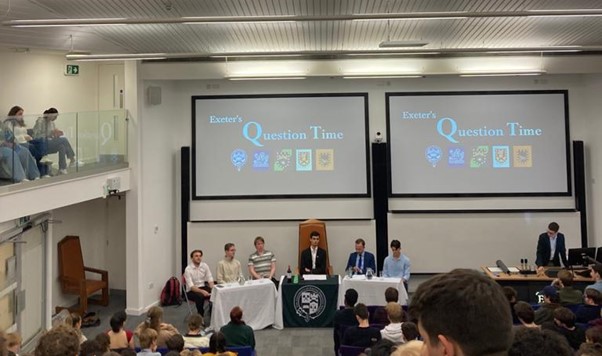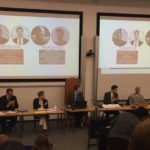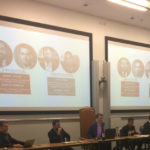
On Friday, 13 October, the University of Exeter’s Debating Society held its first Cross Party Question Time of the year. Making up the all-male panel were Jack Barwell for the Conservatives, Sebastian Racisz from Labour, Thomas Richardson for the Green Party, Francis Motyczak from the Liberal Democrats and Andrew Trovalusci for Freedom Society. Led by one of DebSoc’s chairpeople Jacob Browne, each representative answered a series of questions posed by the audience. This Question Time centred around five major issues: immigration, multiculturalism, the economy, strike action, and gender-based violence. A pre-debate opinion poll was organised, where Labour won with sixty-eight votes. Despite this victory, everything was still to play for, given that sixty-four voters opted for “no preference”, making it the second most popular option. The stage was set for a political sword fight, with all five panellists hoping to win the affection of the crowd.
The opening speeches allowed each candidate to outline their main priorities and criticise the government, or in Barwell’s case, emphasise the achievements of the party during their thirteen years in government. The Green candidate kicked off the event, opting for an unsurprising focus on the climate. Richardson outlined that three out of four Britons worry about climate change, and blasted the Conservatives for their obvious apathy towards the climate and preferred focus on culture wars and misinformation. Barwell – dressed like this was in fact BBC’s own Question Time – used his opening statement to explain that this was not an issue of right versus left, but “right versus wrong”. He implored the audience to look beyond their preconceived judgements of him due to his familial connections, emphasised his own working-class roots and assured that Conservatism lifts people up and champions the rights of working people.
Next up was Motyczak for the Liberal Democrats. The only representative who referred to the European Union, Motyczak said that we cannot “run away” from Europe, but should aim for closer integration. Labour’s Racisz went next, attempting to charm the audience with his party’s vision for a common humanity and a duty of care to all, insisting that personal circumstances should not have you relegated to the margins of society. Finishing up was Trovalusci for Freedom Society, opting for an unusual style of opening statement in rap form, which received a mixture of horrified gasps and rapturous applause from the audience. Few people had ever seen iambic pentameter be employed so creatively in order to describe “ethnic battle royales”, how “immigrants are coming” to the UK and “committing lots of crimes”, or disclaim that his strong stance does not make him “literally Hitler”. These opening speeches truly set the tone of the evening; it was clear that nothing was going to be left unsaid (although some may dispute this was a positive thing).
Then the questioning commenced, with the first audience question focusing on the economy and public services, and how the parties would tackle the demographic problem of an ageing society. Labour responded first, with Racisz citing the importance of wage reform and how Shadow Chancellor of the Exchequer Rachel Reeves is fighting for a real living wage. Richardson echoed a similar idea, stating that the Greens were dedicated to fighting the youth pay gap, with young people being paid less to do the same amount of work as their adult counterparts. Motyczak hit back at Richardson’s claim, arguing he was grossly misinformed and that paying young people the same wages as adults in the same jobs would only breed youth unemployment. From this point onwards, a chasm started to emerge between the representatives on the left, and this gap widened further throughout the debate as Motyczak distanced the Liberal Democrats from both Labour and the Greens. Barwell then chimed in, hitting back at Racisz’s reference to the living wage, arguing that it all sounds great until the “maths teacher” walks into the room. Barwell preferred to focus on pensions, on what the Conservatives have done to combat the low birth rate in Britain, and blasted Labour for their housing plans, which supposedly involve building houses on the so-called “green belts”. Trovalusci argued that Britain’s Town and Country Planning Act was the strictest in the world, and needs to be revoked in order to build more housing and help tackle the demographic issues. In true Trovalusci fashion, this issue was effortlessly linked back to his favourite topic, immigration, with him asking how building houses on the “green belts” can be avoided when we have one million people coming into the UK each year.
The second question proposed to the candidates referred to the state of the NHS and the ongoing strikes. Richardson said the Green Party’s stance was clear, supporting the NHS strikes, whilst Labour used the strikes as an example of public distrust in the government, with Racisz outlining how Labour will work with doctors and nurses and reinvest £1.5 million into the National Health Service which will be paid for by abolishing the “non-dom” tax status. Motyczak and Barwell shared similar ideas about how we shouldn’t have to need so many foreign workers within the NHS, with Barwell arguing for the creation of more grammar schools to form a new generation of great nurses from within our own country. Barwell went on to defend the Government’s position during negotiations with the strikers, and shot down a member of the audience who questioned him by saying “I think I am talking, not you”. Trovalusci answered the question by calling for a complete systematic overhaul of the NHS model, mirroring the Japanese healthcare system, and ironically called for people to stop being so “fiercely nationalist” about the NHS, which invited laughter from the audience.
Question three quizzed the candidates on their stance on nuclear energy. Barwell approached this with his tail between his legs; he admitted the Conservatives have not made sufficient progress with rolling out nuclear energy, but emphasised the importance of sticking to the 2050 net-zero target. This target, according to Barwell, will protect the futures of our young people, without leaving working-class communities behind. Trovalusci also referred to the net-zero targets and called for action on nuclear power now in order to be able to reach the 2050 goal. Unsurprisingly, Richardson and Barwell got into a tit-for-tat over the viability of green options outside of metropolitan areas as an alternative to nuclear energy; Barwell argued that electric cars are not really an option in rural parts of the country, whilst Richardson hit back saying that this is because the Conservatives have failed to build sufficient electric charging infrastructure, and that thanks to government inaction on nuclear infrastructure, it is now too late to consider nuclear energy as an option. Motyczak and Racisz made similar points on the usefulness of green energy sources, but the Liberal Democrats went one step further by calling the Green party policies “unattainable”, whilst Trovalusci blasted the “religion of renewables”.
The political activism of Just Stop Oil was the next topic of discussion. Barwell came in with a scathing criticism of the organisation, arguing that left-wing radicalism is the biggest threat to working people and that Just Stop Oil does not care for democracy, having not suffered the impacts of the cost of living crisis. Racisz condemned the targeting of working-class people by their protests, but fired shots at the Conservative party, saying it is unlike them to speak out against protests. Richardson demonstrated an unsurprising steadfast show of support for Just Stop Oil, drawing a comparison between their actions and those of the universal suffrage movement. Potentially the most juxtaposing answer was that of Trovalusci, who started by criticising Just Stop Oil for being too “safe” with their activism, and then went on to say he feared them and their “growing extremism”.
Following on from this was a question about immigration. Given this topic seemed to be Trovalusci’s raison d’être, it was not shocking that he was well-prepared for a question that was clearly aimed at him. After clarifying he would in fact not get rid of immigrants who have already settled here (because in his own words, he is not “a maniac”), he argues immigration has grown astronomically, is a “net drain on the economy” and warned that the country will “continue to suffer” if nothing is done. Trovalusci’s solution was clear; stop giving out 1.5 million immigrant visas a year, and deal with asylum seekers’ claims in the Channel, sending those with inadequate asylum claims back to France immediately. Barwell then attempted to “bust some myths” about immigration and turned his attention to the Labour Party. He said that Labour claims to say they “love immigration” until there are people coming into Britain with strong religious convictions who want to bring their own social values with them. Racisz went on the defence, attempting to share his experience as a first-generation immigrant from a religious background in order to combat this accusation. Then Trovalusci waded in, citing that Labour’s shadow home secretary had recently said that legal migration was too high. Racisz was unaware of this development, and this meant his attempt to clarify Labour’s position on immigration fell slightly flat.
The tension potentially reached its peak when a male audience member decided to ask the candidates about their views on “women’s issues”, and alluded to the fact a female family member had just moved to London and felt extremely unsafe in her majority immigrant neighbourhood. This apparent correlation made by this audience member between his sister’s personal safety and the number of immigrants living in her neighbourhood outraged a large percentage of audience members, and the responses of the candidates did not do much to quell this. Racisz and Richardson agreed that the idea that immigrants were making the country more unsafe was unfair, citing that Britain had always been a multicultural nation and was built from migration. In an unexpected twist, Motyczak seemed to have more in common with Trovalusci than those on the left on this issue, arguing that you would have to be delusional to not believe that large amounts of immigrants coming from countries with terrible human rights abuses do not affect safety on our streets. Trovalusci then expanded on this, arguing those coming from abroad may have different customs and beliefs which are difficult to “shed”. Barwell took a different approach, stating that villainising religious immigrant communities, for example, was unfair and that we need to focus our efforts towards young men who have been radicalised online in order to reduce gender-based violence.
The debate was finished off with each candidate giving a closing statement, and then the audience was asked to vote again. Labour did not lose their lead, winning the support of the majority with eighty-nine votes. However, Trovalusci’s Freedom Society experienced the biggest increase in public support, gaining twenty-eight extra votes over the course of the debate. Therefore, despite Racisz having done enough to hold onto victory, Trovalusci’s strong anti-immigrant stance and penchant for potentially questionable poetry seemed to have struck a chord with the audience.
Image: Ciara Howard, 2023
Additional resources: Exeter University’s Debating Society Instagram


Average Rating